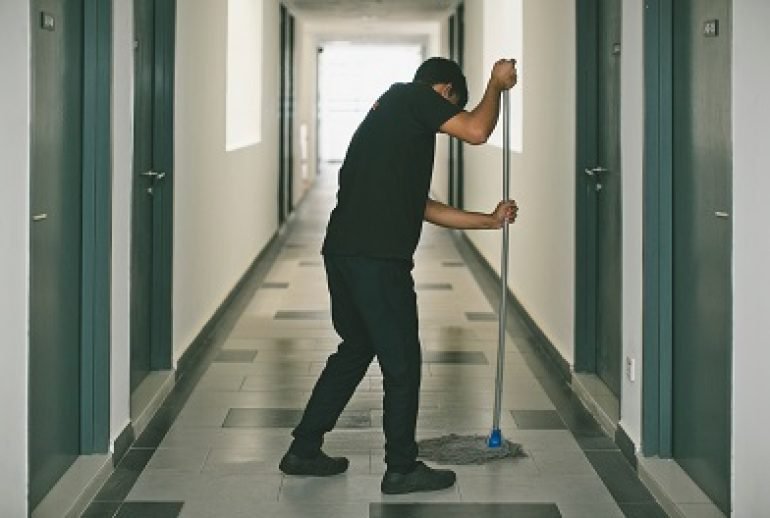Introduction
Running a cleaning business brings unique risks, from wet floors to hazardous chemicals, that can put employees and clients at risk. For any business owner, ensuring employees are safe and protected financially is essential—and this is where workers compensation insurance for cleaning business comes in. Workers’ compensation insurance is not just beneficial but often legally required in the United States, designed to cover medical expenses, lost wages, and rehabilitation services for work-related injuries. For cleaning businesses, where the risk of injury is heightened, having the right insurance coverage, like general liability insurance and workers’ compensation, can safeguard against unexpected financial burdens.
In this article, we’ll explore how workers’ compensation insurance functions, its benefits, and the types of coverage that best suit cleaning businesses. We’ll also delve into a case study to illustrate how workers’ compensation can support your cleaning business in real-world scenarios.
Why workers compensation insurance for cleaning business
Cleaning involves physical labor, exposure to chemicals, and risks associated with repetitive motions and heavy lifting. Even minor injuries, like cuts or muscle strains, can lead to significant expenses without proper insurance coverage.
Benefits of Workers’ Compensation for Cleaning Businesses:
Covers Medical Expenses
Workers’ compensation insurance will cover medical bills resulting from injuries sustained on the job, such as back injuries, chemical burns, or accidental falls.
Wage Replacement
Suppose an employee needs time off to recover from a workplace injury. In that case, workers’ compensation provides wage replacement, helping the employee stay financially stable.
Rehabilitation and Retraining
Workers’ compensation can cover physical therapy, rehabilitation, or even retraining for severe injuries if the employee can’t return to the same job.
Liability Protection for Business Owners
By having compensation insurance in place, business owners avoid the financial strain of medical costs and the legal risks of workplace injuries.
Understanding Insurance Requirements for Cleaning Businesses
In most states, workers’ compensation insurance is legally required for any business with employees. For cleaning companies, this is critical because the industry’s physical nature often leads to work-related injuries.
- Commercial Auto Insurance: If your business involves transporting employees or cleaning equipment, commercial auto insurance will cover vehicles owned or leased by the company.
- General Liability Insurance: This is essential for protecting your business against property damage or personal injury claims.
- Commercial Property Insurance: Protects your business premises and equipment in case of damage from covered events, such as fire or vandalism.
- Janitorial Bonds: While not insurance, janitorial bonds offer protection if employees are accused of theft at client sites, providing clients with peace of mind.
Cost Factors for Workers’ Compensation in the Cleaning Industry
Workers’ compensation insurance costs vary based on several factors, including the state where the business operates, the number of employees, and the type of work performed. In the cleaning industry, which has moderate to high-risk tasks, costs may be higher than in other fields, but these factors help keep rates manageable:
Workplace Safety Initiatives
Focusing on workplace safety, such as regular safety training, protective gear, and careful handling of chemicals, can reduce premium rates.
Number of Employees
More employees mean higher premiums; however, cleaning companies with excellent safety records and lower claims histories may qualify for discounts.
Financial Strength Rating of Insurance Providers
Always choose an insurance provider with a high financial strength rating to ensure they can meet claims obligations, especially if you need comprehensive coverage.
How to Find the Right Workers’ Compensation Insurance
Finding the right insurance plan begins with identifying a reputable insurance company or independent agent who understands the needs of the cleaning industry. Ensure your policy is clear about coverage limits, exclusions, and premium calculations to avoid surprises later. Some other tips include:
- Check for Bundling Options: Many providers offer bundle options, combining workers’ comp with general liability or commercial property insurance for cleaning businesses.
- Request Detailed Quotes: Request quotes based on specific needs and compare policies from different providers.
Case Study: A Real-Life Look at Workers’ Compensation for Cleaning Businesses
Let’s consider the case of Spotless Shine, a small cleaning business with ten employees. During a routine cleaning job at a corporate office, one of Spotless Shine’s employees slipped on a wet floor, injuring their knee. The employee required surgery and three months of physical therapy, totaling nearly $15,000 in medical costs.
Because Spotless Shine had workers’ compensation insurance, the policy covered all medical expenses and the employee’s lost wages. The business avoided out-of-pocket costs and legal issues, and the employee could focus on recovery without financial strain.
This case demonstrates workers’ compensation insurance’s vital role in protecting employees and business owners from financial burdens and legal complications.
Conclusion
Workers’ compensation insurance is an invaluable tool for cleaning businesses, helping ensure employees receive the necessary care and support in the event of an accident. For business owners, this coverage provides financial protection and shields the business from potential legal issues. Paired with additional coverage options like general liability insurance and commercial property insurance, workers’ compensation lays a strong foundation for long-term success and risk management in the cleaning industry.
Incorporating workers’ compensation insurance and other essential coverages into your cleaning business’s risk management plan is a proactive step toward fostering a safe, responsible, and sustainable operation. Whether you’re just starting or managing an established cleaning business, having the right insurance policies is critical to maintaining business stability and providing a safe work environment for your team.
- How to Get Mildew Smell Out of Rug: Complete Guide - May 11, 2025
- Overcoming Language Barriers in French Business Settings - May 5, 2025
- Interior Design Consultants for Stylish and Personalized Interiors Tucson - January 14, 2025

